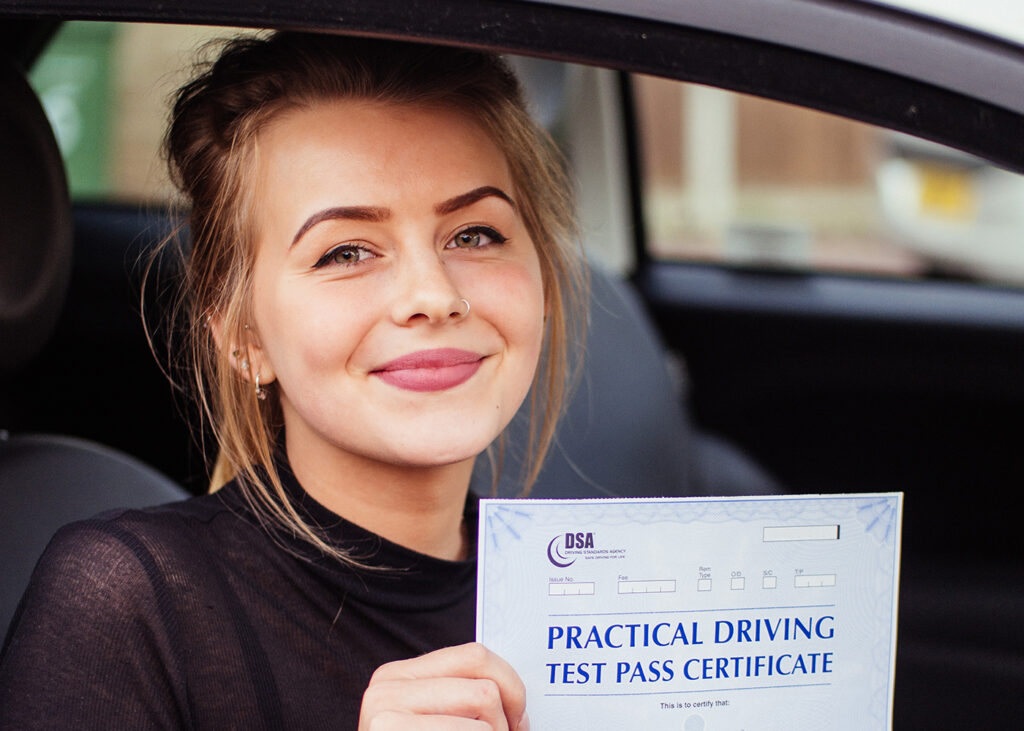Learner drivers were certainly given the short straw over the lockdown period, with tens of thousands of driving tests cancelled and postponed because of the coronavirus situation, and most driving lessons put on hold for months on end.
But it wasn’t all doom and gloom. Those who took their test from March 2020 to March 2021 were actually more likely to pass their test than those who took their test the year before. In this blog, we explore the government’s latest driving test statistics.
Practical driving test pass rate highest since records began

Driving test pass rates have been more or less the same since records began, with the percentage of passes sitting at an average rate of 46.3% since 2007-08. Yet these rates reached a record high in 2020-21, and they even hit an average pass rate of 79.4% in February 2021.
This is highly unusual as average monthly records for practical driving test pass rates have remained in the 40th percentile since records began in 2007.
While the causes of this haven’t been discussed by the awarding body, it could be the result of a number of reasons, including new measures put in place to slow the spread of coronavirus. Speculatively, these reasons could include:
- Key workers who were able to book their test could book driving lessons and intensive courses more easily when lockdown rules were in place as fewer people were allowed to learn how to drive. They could have taken more lessons as a result.
- The changes to driving tests as a result of COVID-19 could have affected pass rates, such as:
- Keeping at least two windows open has improved learner driver alertness.
- Ruling against having passengers in the car during the test has reduced distractions and stress.
- The number of learners taking their test while ill (even minor illness) has reduced.
- Roads were quieter so there were fewer hazards while learning and during the test.
- More time at home to study the rules of the road and prepare for the test.
- Driving examiners were more lenient with learner drivers given the circumstances.
Pass rates for men and women
The average pass rate for women was 49.8% in 2020-21, which is the highest it’s ever been since records began in 2008. Similarly, men have also seen a record-beating pass rate, with the average pass rate being 52.5%.
Theory test pass rate highest since 2013
Similarly, theory test pass rates for learners reached the highest level since 2013. The year saw an average theory test pass rate of 55.7%, and a peak in April 2020 of 79.3%. Incredibly, the monthly average for the year didn’t dip below 50%, which is also a first since 2013.
Pass rates by age and gender

Out of all the age groups, learners aged 17 had the highest pass rate at 64%, the highest in a decade.
Women had an average pass rate of 58.3%, while men had an average pass rate of 53.4%. This is generally in line with theory test rates by gender, as women tend to do better on the theory test compared to men.
Sudden change to the downward trend
Interestingly, in the last decade the pass rate for theory tests was on a downward trend, with rates decreasing from 65% to 47.1% between 2007 and 2020. According to Theory Test Pro, this is likely to be the result of several changes over the years to the way theory tests are conducted. This includes:
- Starting from 2012, new DVSA questions are no longer published, meaning that students are not able to learn questions and answers off by heart as easily.
- In 2013, the majority of questions underwent a refresh. Coupled with the update above, this meant the majority of test questions were not available to study prior to learners taking the test.
- Foreign-language voiceovers and interpreters are no longer allowed in 2014, making it more difficult for non-native English speakers to pass.
Although the above still applied in 2020-21, it might be that learners had more time on their hands to study as schools, colleges and universities put classroom learning on hold throughout the lockdowns and more people had time at home.
It’ll be interesting to see whether theory and practical test pass rates return to the levels they were at before the COVID-19 situation once restrictions ease.
Ready to start learning again?
Whether you’ve been waiting to take your test over lockdown or you’ve just started learning how to drive, make sure you get enough practice on the road before your test. Going out with a parent, guardian or friend is a great way of getting more time behind the wheel in between your official lessons.
Just make sure you have a robust learner driver insurance policy in place beforehand. If you’re learning in someone else’s car, taking out your own cover will help ensure that, even if you need to make a claim, you won’t affect the owner’s no claim bonus (NCB).
At Adrian Flux, we offer policies from just 65p per day. We even allow you to build up your own NCB, which can be used to get cheaper premiums when you pass – give us a call on 0800 369 8590 or book a callback to find out more.

